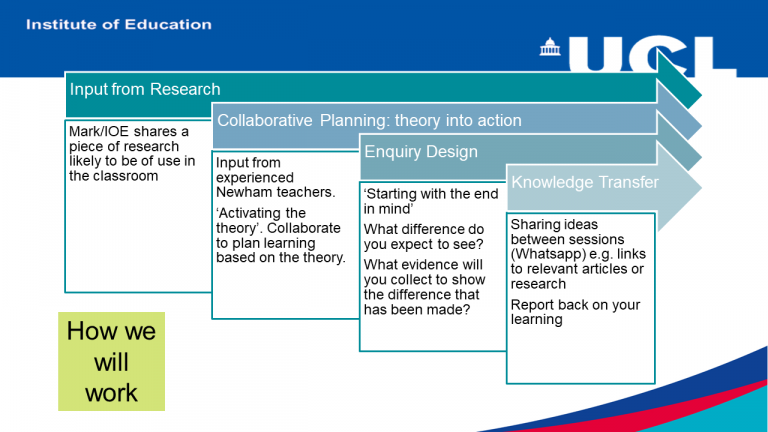The Newham Early Career Teacher Programme
Three teaching school alliances commissioned IOE to deliver CPD for primary school teachers in their second year of teaching.

29 November 2018
Background
IOE has a long-established CPD relationship with Newham schools. For several years we have run programmes on behalf of the three Teaching School Alliances (TSAs), for NQTs during induction and for those in the second year of their careers (often called NQT+1s.). These have been popular and successful and, through them, reached hundreds of teachers serving children and families in the area.
The design of the current programme arose out of Mark Quinn’s work over several years with NQTs in Chace Community School in Enfield.
Challenge
Analysis of teacher retention for the Department for Education reveals that teachers are most prone to leave the profession between the third and fifth years of their careers. Issues of excessive workload and increased and changing accountability pressures are at the fore. NQT+1s may be particularly vulnerable as, typically, they lose the mentor support they enjoyed during initial training and induction.
English staffrooms are among the youngest in the OECD because older or more experienced colleagues are leaving. Consequently, NQT+1s are also likely to be tapped on the shoulder for promotion at a stage in their careers when they may not feel ready.
Newham TSAs therefore identified teacher retention and leadership development as a strategic priority. Whereas no single programme could hope to ‘solve’ those issues, it was hoped that they could at least be positively addressed.
Solution

The IOE constructed a programme designed to help teachers to:
- Trial research-informed teaching and learning approaches in their classrooms
- Develop tools to critically evaluate the impact of these approaches
- Enhance their confidence as teachers through collaboration with colleagues in and across Newham schools
- Reflect on and debate the way they teach
- Develop leadership awareness within and beyond their classrooms
- Deepen their ‘practice wisdom’ - the learning from experience which is critical to the next stage of their development.
Over six workshop sessions – spread evenly across the year – introduced research from five pedagogical themes, which the teachers then used to inspire episodes of learning in their own classrooms. The teachers designed some simple evidence collection tools on the impact of these episodes, so they could report back on impact. All the while, they were encouraged to ‘bank’ their experiences in the belief that this would enhance their practice wisdom, and ready them for the early leadership opportunities that would inevitably come their way.
Impact and results
Selecting from a range of options, the teachers explored easily accessible representations of research from these pedagogical areas:
- Pupil voice
- Differentiation
- Creativity
- In-class pupil grouping
- Growth mindset.
They applied their takeaways from these themes to their own classrooms and noted the outcomes for their pupils, then shared these back with the group. Examples of areas whether innovation took place included:
- Girls who lacked confidence and identified as English as another language (EAL) learner found their voices
- Pupils in Year 6 expanded their vocabulary on the Romans through the use of a knowledge organiser
- Science lessons took on a creative approach and showcased in an assembly.
18 teachers completed the full programme; three dropped out along the way when their school withdrew them. The majority of participating teachers initially felt very challenged by the approach the programme took – relying, as it did, on their willingness to experiment with unfamiliar approaches and to collect evidence which might show only small changes in their pupils’ learning. These teachers were, after all, at the beginning only three weeks into their post-NQT teaching. The fact that so many rose to those challenges, and banked so much practice wisdom, was the main positive outcome.
All those who completed the programme were determined to stay in teaching – at least for now. Some have indeed accepted promotions, so will be going into their next year as year or subject leaders. They all felt more confident now as teachers, and better evidence- and research-informed.
Going forward, we have decided to rebrand the programme as an Early Career Teacher programme so that it draws in not only NQT+1s but others in their early years of teaching.
 Close
Close

